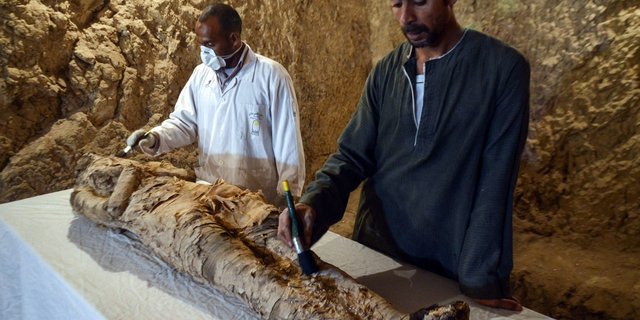One of the finest civilizations to grace the Earth during the ages is the glorious ancient Egyptian Pharaonic culture. It left the world in absolute surprise, standing puzzled before the enigma of this brilliance that spanned through millennia. Unlike other modern civilizations that succumbed to the upheavals the planet underwent, ancient Egypt's brightness did not weaken or fade away.

Among the most unusual and astounding facts about the Pharaohs:
Fly Deterrence with Honeyed Slaves:
To avoid flies from falling on and irritating him, King Pepi II (Neferkare) had an unusual solution. He would bring a troop of slave workers whose bodies were fully smeared with honey.
Ancient Antibiotics - Moldy Bread:
Despite the recent discovery of antibiotics, ancient Egyptians cured diseases using moldy bread. Mold on the bread, notably Penicillium fungus, was utilized to extract Penicillin, one of the most famous antibiotics.
The Sphinx's Nose Mystery:
Many traditions ascribe the damage of the Sphinx's nose to Napoleon during the French campaign in Egypt. However, drawings uncovered predate the French campaign by about 60 years, and they do not portray the Sphinx's nose. In truth, the person responsible for breaking the Sphinx's nose was a man named Sa’im Al-Dahr, hanged in 1378 for public property destruction.
Cylindrical Earth Belief:
Ancient Egyptians believed the Earth was cylindrical, with some sections being circular and others flat. They imagined the Nile River flowed at its middle.
First Pyramid - Zoser's Step Pyramid:
The first pyramid ever built was the Step Pyramid of Djoser in Saqqara. It was enclosed by a 34-foot wall featuring 15 entrances, although only one of these doors was functioning.
Building the Great Pyramid:
Contrary to the widespread myth of 100,000 slaves building the Great Pyramid, evidence reveals a workforce of roughly 10,000 experienced Egyptian laborers. They were well-cared-for persons, referred to as the "Friends of Khufu," getting attention in financial, medicinal, and honorary aspects.
Organ Removal in Mummification:
During mummification, every organ was removed from the body except the heart. Ancient Egyptians believed the heart held the soul.
Pharaonic Hairstyle Secrecy:
Pharaohs were not allowed to reveal their hair. They decked themselves with crowns or headgear, much like Tutankhamun's renowned headdress.
Women's Equality in Ancient Egypt:
Surprisingly, women in ancient Egypt had legal and economic equality with males. However, they did not have the same level of social equality.